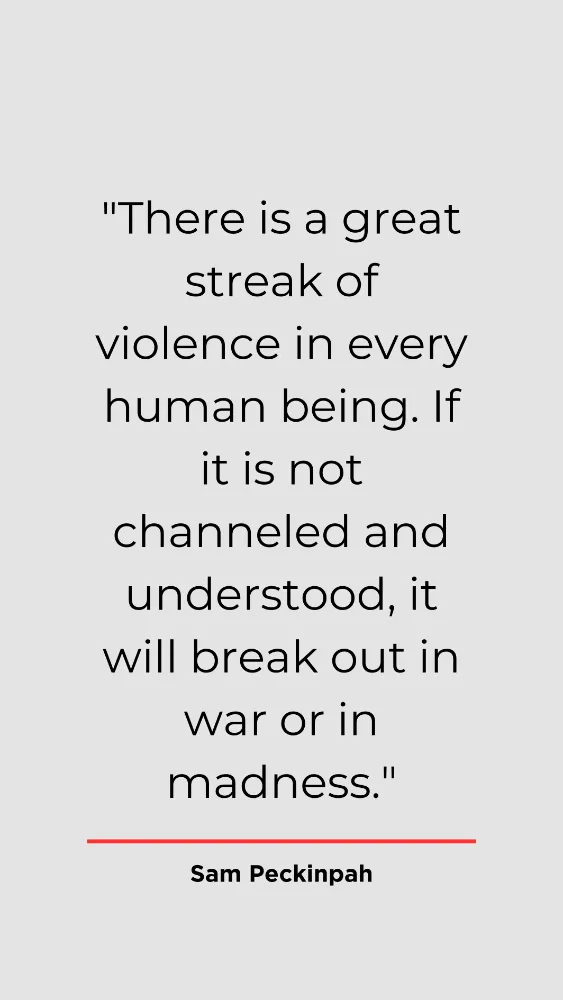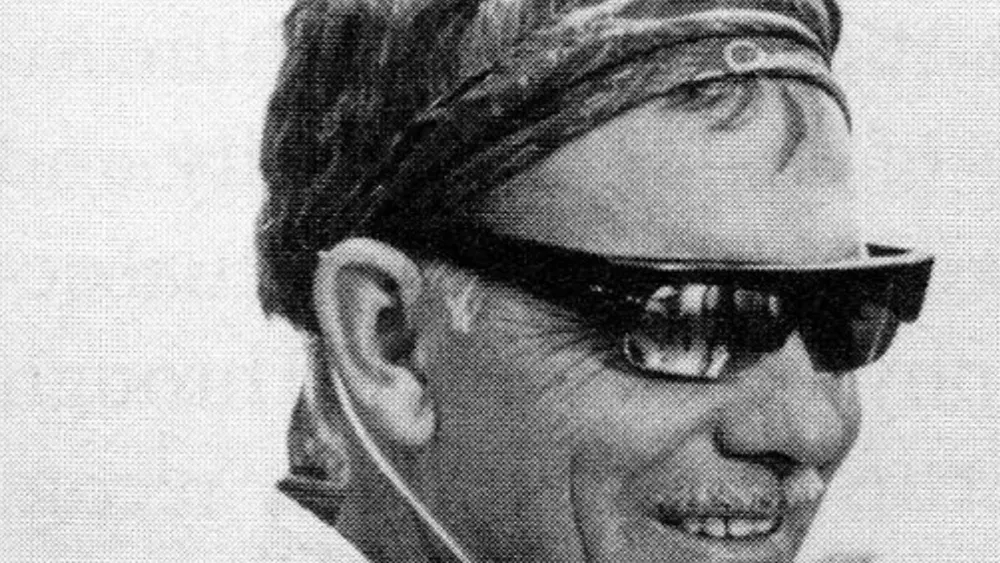David Samuel, aka Sam Peckinpah, was an American film director and screenwriter. His 1969 Western movie, “The Wild Bunch” earned an Academy Award nomination and ranked 80th on the American Film Institute’s Top 100 list.
Peckinpah’s films were known for their innovative visuals and explicit portrayal of action and violence, challenging traditional Western themes. His works explored conflicts between values, human corruption, and violence.
Nicknamed “Bloody Sam” his characters often navigated a harsh world, reflecting Peckinpah’s combative personality. Substance abuse and conflicts during film production tarnished his professional legacy, impacting his reputation and career.
Bloody Sam: The Persona and Personal Struggles
Born on February 21, 1925, David Samuel Peckinpah was a notable American film director and screenwriter. His impactful 1969 Western film, “The Wild Bunch” received an Academy Award nomination. Moreover, he secured the 80th spot on the American Film Institute’s top 100 list.
Peckinpah earned recognition for his visually innovative style, introducing a fresh perspective on action and violence. Moreover, he challenged traditional Western norms. His approach marked a departure from conventional cinematic norms. Also, his movies delved into the conflicts between values, human corruption, and societal violence.
Peckinpah’s characters often found themselves as loners or losers striving for honor in a world tainted by nihilism and brutality. Due to the intense violence depicted in his films, he earned the moniker “Bloody Sam.”
However, Peckinpah’s career faced challenges due to his combative personality, fueled by years of alcohol and drug abuse. Producing his films often involved battles with producers and crew members, damaging his professional legacy during his lifetime. Despite the setbacks, his impact on cinema remains significant, especially in redefining the Western genre.
Behind the Scenes: Filmmaking Battles and Bonds
In 1954, David Peckinpah started as a dialogue coach for “Riot in Cell Block 11,” working with director Don Siegel at Folsom Prison.
The warden, recognizing Peckinpah’s family background, allowed the shoot. Peckinpah continued coaching Siegel on movies like “Private Hell 36” and “Invasion of the Body Snatchers,” where he also acted. This sci-fi film became a hit, though Peckinpah’s claim of rewriting its script is debated.
Battling alcoholism and possibly mental health issues, his personal life was tumultuous.
After divorcing his first wife and marrying Begoña Palacios, he had a volatile relationship marked by passion and conflict, mirroring his intense films.
David Peckinpah: Mexican Sojourn
David Peckinpah, known for his tough and violent image, was influenced by the content of his popular films. This perpetuated a reputation that affected his artistic legacy.
Despite this, his friends and family argue that he is more complex than commonly believed. Peckinpah collaborated with actors like Warren Oates and Kris Kristofferson, forming lasting bonds.
After marrying Begoña Palacios, he immersed himself in Mexico, capturing its essence in films like “The Wild Bunch” and “Bring Me the Head of Alfredo Garcia.” Despite his rugged image, he settled in Montana in 1979, continuing to work until his death at 59 in 1984.
David Peckinpah: A Rollercoaster Romance
In the early stages of his film career, following the cancellation of The Westerner, Brian Keith obtained a role in the 1961 Western film. This movie is “The Deadly Companions.” He recommended Sam Peckinpah as the director, and producer Charles B. Fitzsimons agreed. The low-budget film, shot in Arizona, became a learning experience for Peckinpah, marked by conflicts with Fitzsimons over the screenplay and scene staging. Fitzsimons reportedly restricted Peckinpah from directing Maureen O’Hara. Unable to influence the script or edit the film, Peckinpah vowed not to direct unless he had script control. “The Deadly Companions” went unnoticed, remaining the least known of Peckinpah’s films.
Legacy Beyond Borders: “Cross of Iron” and European Acclaim
1973, a challenging period unfolded in Sam Peckinpah’s life and career. While working on “The Getaway” in El Paso, Texas, he clandestinely crossed into Juarez in April 1972 to marry Joie Gould. They had met while filming “Straw Dogs” in England, and she had become his companion and a part-time crew member.
Peckinpah’s alcohol consumption soared during the making of “The Getaway,” and he claimed, “I can’t direct when I’m sober.” Experiencing violent mood swings, he assaulted Gould, leading to her return to England and the initiation of divorce proceedings after four months.
David Peckinpah: Choosing ‘Cross of Iron’ over Blockbusters
Furthermore, He declined offers to direct blockbusters like “King Kong” and “Superman,” choosing instead the gripping World War II drama, “Cross of Iron” (1977).
The film, which depicts a German platoon on the brink of collapse in 1943 on the Eastern Front, was shot in Yugoslavia on a limited budget.
Collaborating with James Hamilton and Walter Kelley, Peckinpah rewrote the screenplay and immersed himself in Nazi documentaries.
Facing financial challenges, he invested $90,000 personally to hire an experienced crew. Despite obstacles and Peckinpah’s struggles with alcohol, the film, co-starring James Mason and Maximilian Schell, found massive success in Europe but struggled in the U.S., overshadowed by “Star Wars.” Today, “Cross of Iron” is celebrated for its impactful battle scenes, recognized as the last showcase of Peckinpah’s once-great talent, earning praise from Orson Welles.
Sam Peckinpah: Revelations and Resilience
In 1978, Sam Peckinpah aimed to make a big movie with “Convoy.” Despite concerns about his substance use, he wanted to turn the project, based on a popular song, into something meaningful.
Dissatisfied with the script, he encouraged actors to change their lines and introduced black actors to add a new dimension. Starring Kris Kristofferson, Ali MacGraw, and Ernest Borgnine, the film faced troubles, with Peckinpah’s health deteriorating.
James Coburn stepped in as a second unit director. Although “Convoy” made $46.5 million, it was heavily criticized, damaging Peckinpah’s reputation.
Unemployed for the first time in years, the movie became his highest-grossing but most criticized work.

The Final Act: Sam Peckinpah and His Last Days
Sam Peckinpah faced his final curtain on December 28, 1984, succumbing to heart failure at the age of 59 in Inglewood, California.
Despite grappling with serious health issues during his last years, Peckinpah persisted in his craft until the end, leaving an indelible mark on the world of cinema.
He was deeply involved in crafting the script for “On the Rocks”, an independent film scheduled for filming in San Francisco at the time of his passing.
His death marked the conclusion of a turbulent but prolific career, with a legacy defined by innovation, controversy, and a relentless pursuit of his artistic vision.
Life Lessons from Sam Peckinpah
Sam Peckinpah’s life teaches us about unwavering artistic vision, adversity resilience, and storytelling’s power to explore complex human themes. His collaborations underscore the importance of strong relationships in the creative world. Despite personal struggles, Peckinpah’s lasting impact on cinema highlights the enduring influence of dedicated artists.




